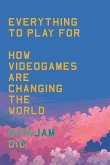By focusing on the experiences of users, gamers, and audiences inside one of the world's largest gaming communities (Xbox Live), this book provides an overview of the landscape, architecture, and socio-technical structure of console gaming. Building on previous research regarding race, gender, and technology, it provides a much-needed intersectional approach to virtual gaming communities. It draws from a wide breadth of disciplines and interviews with minoritized and marginalized users to offer an overview of the virtual oppressions these individuals navigate and resist.
In this 10th Anniversary Edition, author Kishonna L. Gray introduces the audience to a perspective on console gaming environments called "Multi-mediated Interactive Console Environments." This new chapter provides a necessary understanding of these dynamic digital communities, adding console games, which have been heretofore left out of conversations on gaming, to platform studies, and addressing troubling examples on race, gender, and other identities. While the majority of scholarship on gaming comes from disciplines related to media studies and communication, it is imperative that other scholars engage the narrative and help move the focus on gaming beyond acts of violence or as a space that propels the military-industrial complex.
By bringing together cultural studies, criminology, media studies, game studies, and others, this text offers interdisciplinary approaches to making sense of not only the technology and its impact on users and cultures but also the impact that (sub) cultures have had on gaming. It is essential reading for scholars and practitioners seeking solutions to some of gaming's biggest challenges such as how to reduce harm in online gaming.
In this 10th Anniversary Edition, author Kishonna L. Gray introduces the audience to a perspective on console gaming environments called "Multi-mediated Interactive Console Environments." This new chapter provides a necessary understanding of these dynamic digital communities, adding console games, which have been heretofore left out of conversations on gaming, to platform studies, and addressing troubling examples on race, gender, and other identities. While the majority of scholarship on gaming comes from disciplines related to media studies and communication, it is imperative that other scholars engage the narrative and help move the focus on gaming beyond acts of violence or as a space that propels the military-industrial complex.
By bringing together cultural studies, criminology, media studies, game studies, and others, this text offers interdisciplinary approaches to making sense of not only the technology and its impact on users and cultures but also the impact that (sub) cultures have had on gaming. It is essential reading for scholars and practitioners seeking solutions to some of gaming's biggest challenges such as how to reduce harm in online gaming.
Drawing from a range of sociological theories of race, gender, and collective behavior, this book provides an intersectional analysis of virtual communities-specifically Xbox Live (an online video gaming platform). Using game narrative and ethnographic data, Gray illuminates how video games serve as ideological projects that reproduce the unequal representation and treatment of people of color and women within the gaming community. Accessibly written and supported by rich qualitative data, this book could be invaluable in sociology and game design courses alike.
--Bertan Buyukozturk, Department of Sociology, Florida State University
--Bertan Buyukozturk, Department of Sociology, Florida State University








